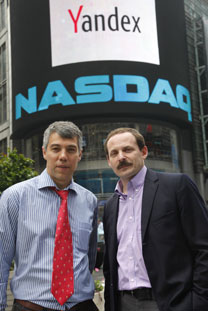Can ‘Russia’s Google’ survive its great loss?

Yandex claims 62 percent of Russia’s rapidly expanding search-engine market, compared with Google’s 26 percent share. Source: PhotoXPress
Technology companies depend on the vision of their founders. So it was a heavy blow to Yandex, dubbed the “Russian Google,” to lose Ilya Segalovich, the man sometimes called the Russian Steve Jobs.
Yet Yandex, which handles more than twice as many searches in Russia as Google, may be so far ahead that it can continue to hold its lead, market-watchers say.
“The loss of Segalovich was a big loss for the company,” says Anna Lepetukhina, a Moscow-based Sberbank analyst. “[But it] has a very strong position in Russia, and I think it can continue growing. This is underpinned by the fact that new initiatives and new launches they made this year have already translated into revenue growth.”
 |
| Ilya Segalovich and Arkady Volozh.
Source: AP |
Segalovich, who died of brain cancer in July at age 48, co-founded the company in 1997, the year before Google launched, with his partner, Arkady Volozh. He also coined the name “Yandex,” which stands for “Yet Another Index.”
Today, the company claims 62 percent of Russia’s rapidly expanding search-engine market, compared with Google’s 26 percent share. Web advertising in Russia rose 35 percent last year and analysts say it may rise 32 percent in 2013.
In February, Yandex overtook Microsoft’s Bing as the world’s fourth most popular search engine, after Google, Baidu and Yahoo, according to figures from comScore, a U.S. Internet analytics company.
Shortly after announcing Segalovich’s death, Yandex posted financial results for the second quarter, which beat analyst expectations, with net income rising 47 percent to 2.92 billion rubles ($89 million). The company also forecast that 2013 revenue would rise as much as 38 percent, faster than previously expected.
In the past 12 months, Yandex shares have risen about 50 percent. Google rose roughly 27 percent in the same period, and Apple has fallen about 31 percent. Since Segalovich’s death, Yandex shares have fluctuated but are up slightly. While the decrease was roughly in line with a decline in the broader Russian stock market, there is speculation as to what lies ahead for the company.
Segalovich’s death drew comparisons between Yandex and California-based Apple, whose visionary founder, Steve Jobs, died in October 2011. Strong financial results continued to propel Apple shares upwards for a year after Jobs’ death, from about $400 per share to an all-time high of $705.
But in late 2012 Apple fell back below $400 as investors fretted over slowing growth and a lack of new products. This year, Apple has swung between $400 and $500, as activist investor Carl Icahn urges its new CEO, Tim Cook, to use more cash to buy back shares.
“I believe Yandex can continue growing and developing without Segalovich, because the company still has Volozh,” Ms. Lepetukhina says. “Volozh has the vision, and he’s behind the company strategy. The company has also built up a strong product-development team.”
Other analysts agree. Yandex “remains ideally positioned to benefit from growth in the Russian online advertising market, with leading positions in its most valuable part, the context-based advertising market,” Moscow-based financial corporation Uralsib noted after Yandex’s second-quarter results were posted.
Yandex’s position is “secured by leadership of the online search market and supported by the boost provided by mobile Internet users, where it continues to outperform its competitors, including Google,” Uralsib said.
Analysts also cite Yandex’s international positioning as a factor making the stock more attractive to Western investors. While the company’s business focus is Russia, the firm is legally registered in the Hague and trades on New York’s NASDAQ stock exchange as an American Depository Receipt.
Related:
Yandex co-founder Ilya Segalovich dies at 48 in London
Yandex is also making inroads beyond Russia’s borders: it accounts for some 33 percent of searches in both Ukraine and Kazakhstan, and 43 percent of searches in Belarus.
Analysts at TheStreet.com upgraded Yandex from “hold” to “buy” on August 27. “The company’s strengths can be seen in its robust revenue growth, largely solid financial position with reasonable debt levels by most measures, notable return on equity, expanding profit margins and good cash flow from operations,” they told investors.
The analysts also cited a “very high” gross profit margin of 77 percent.
Yandex raised $1.3 billion in an initial public offering on NASDAQ in 2011.
All rights reserved by Rossiyskaya Gazeta.
Subscribe
to our newsletter!
Get the week's best stories straight to your inbox
